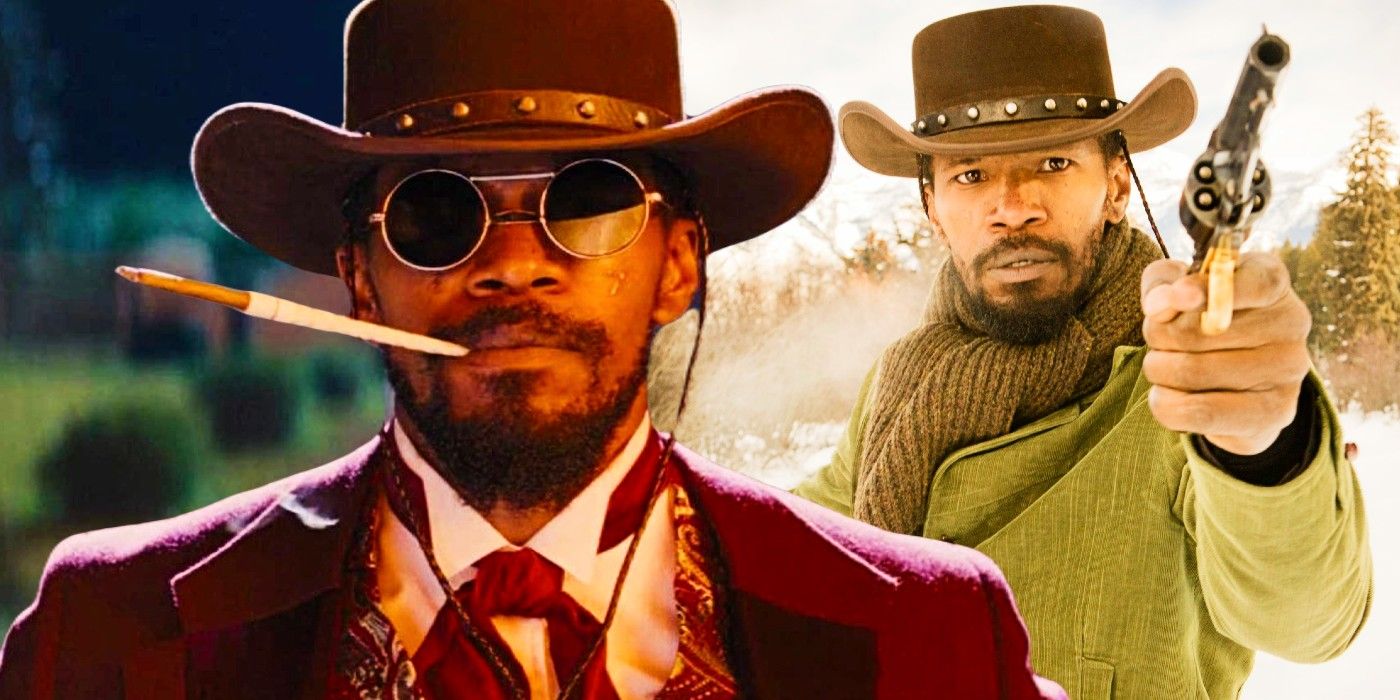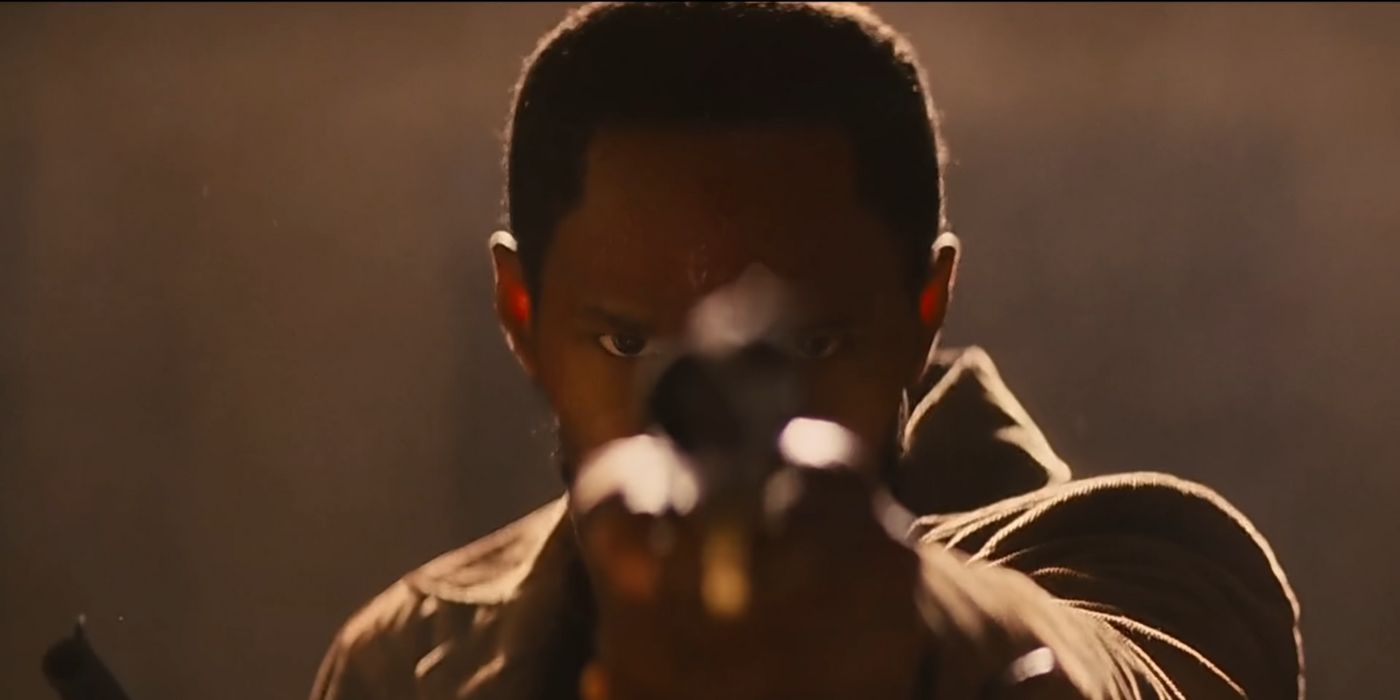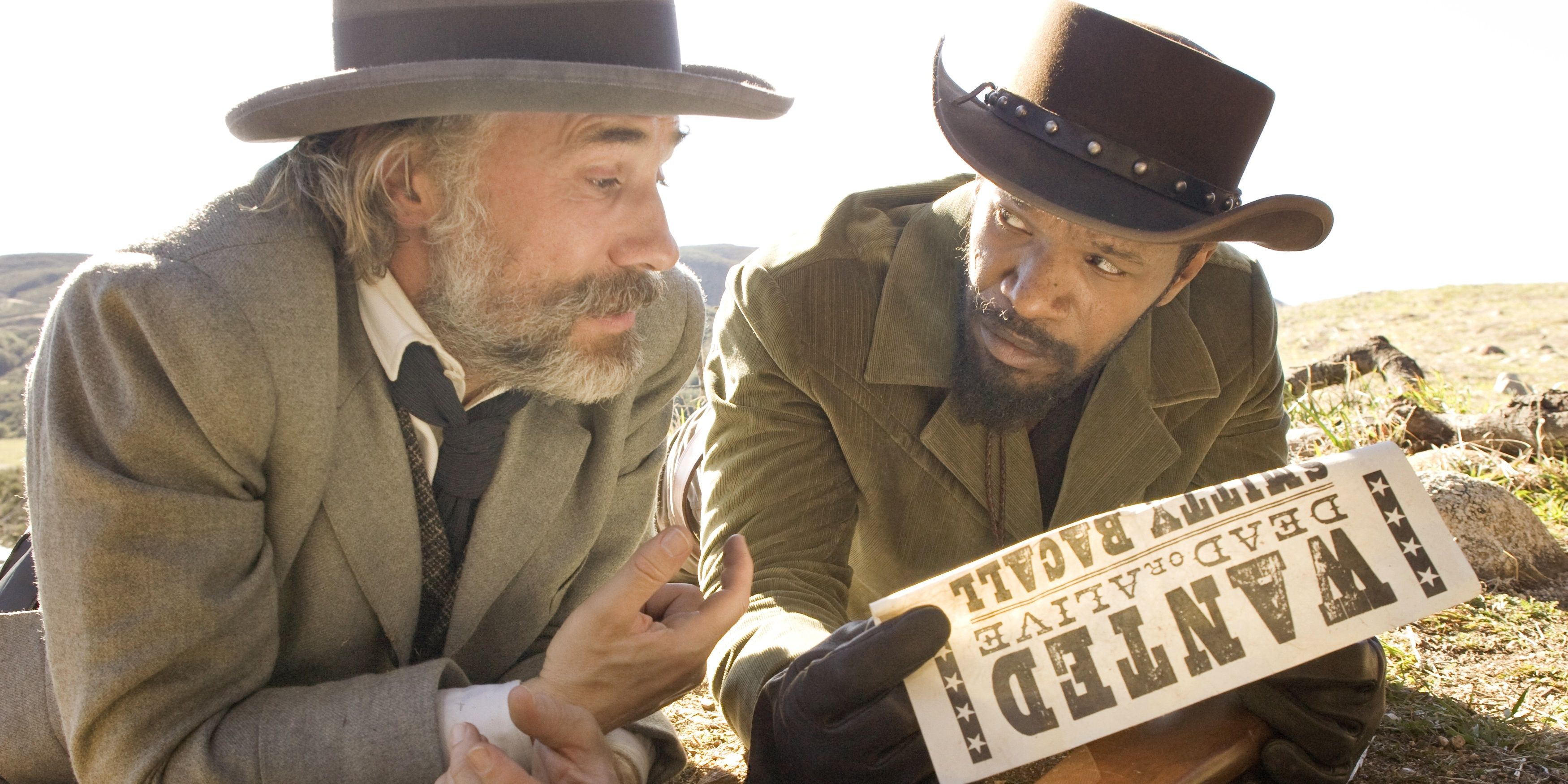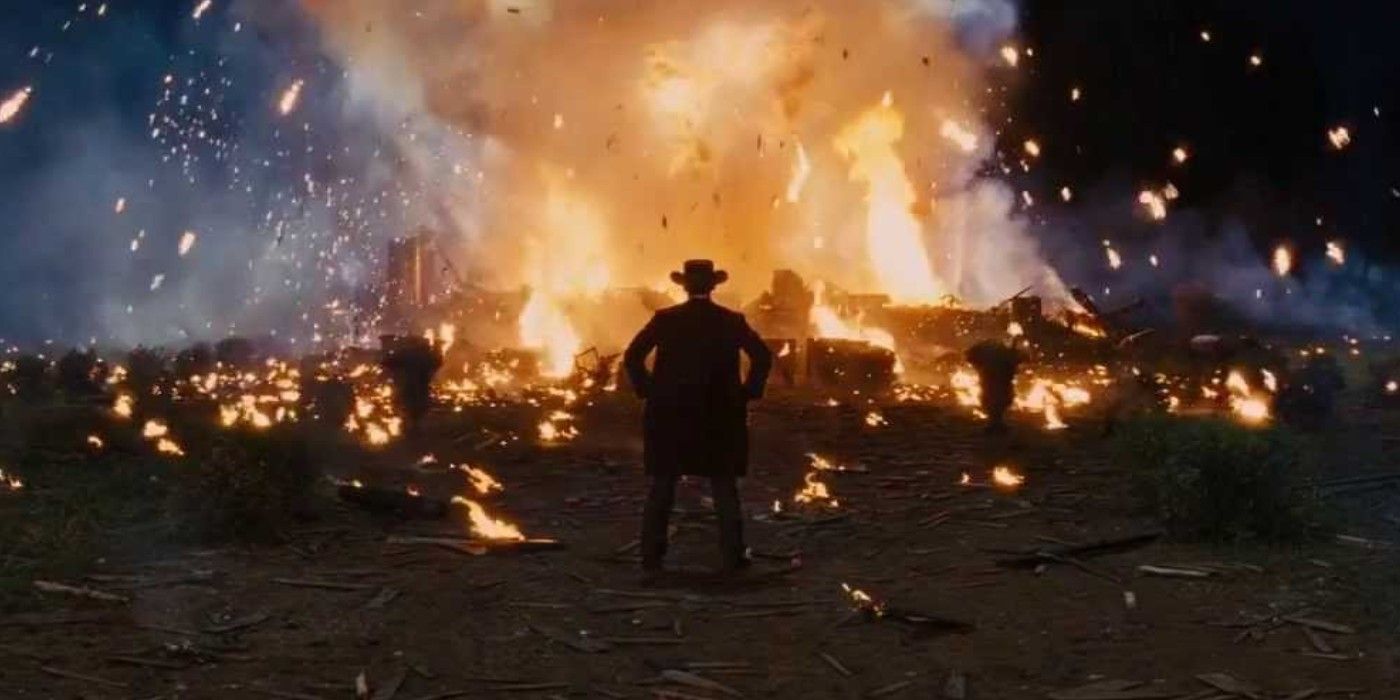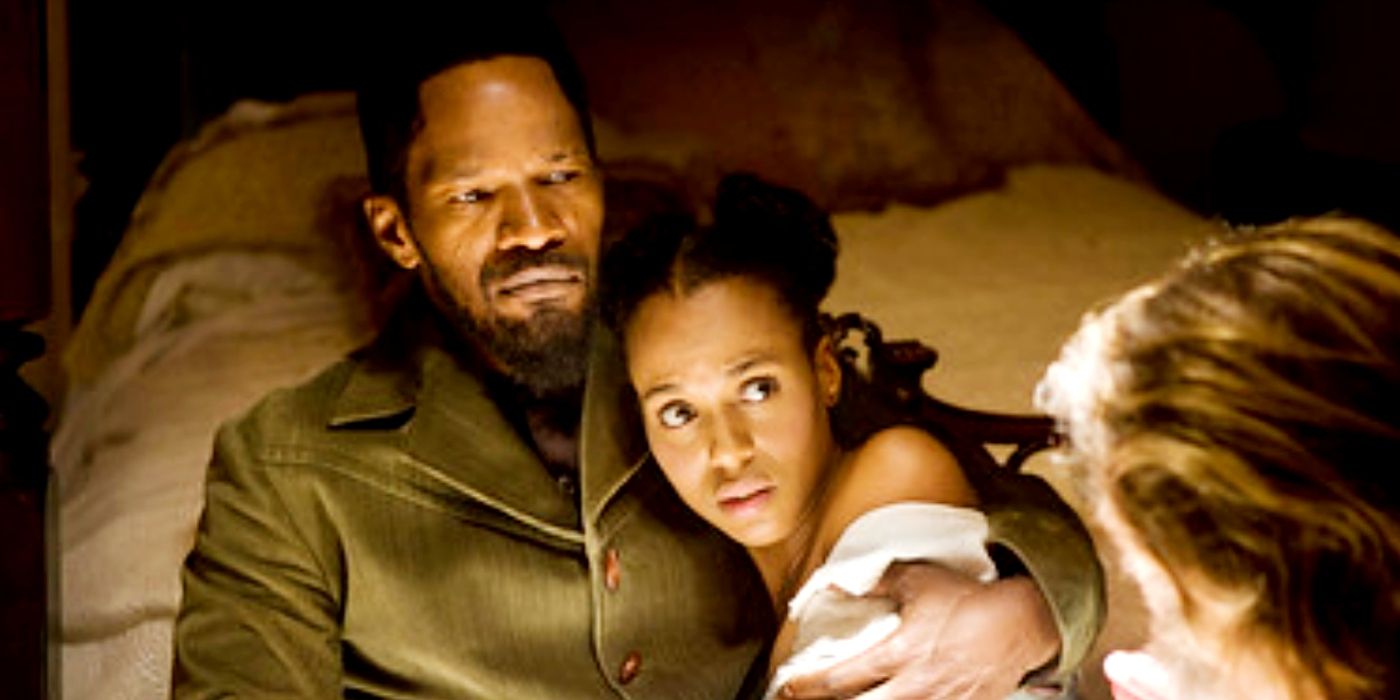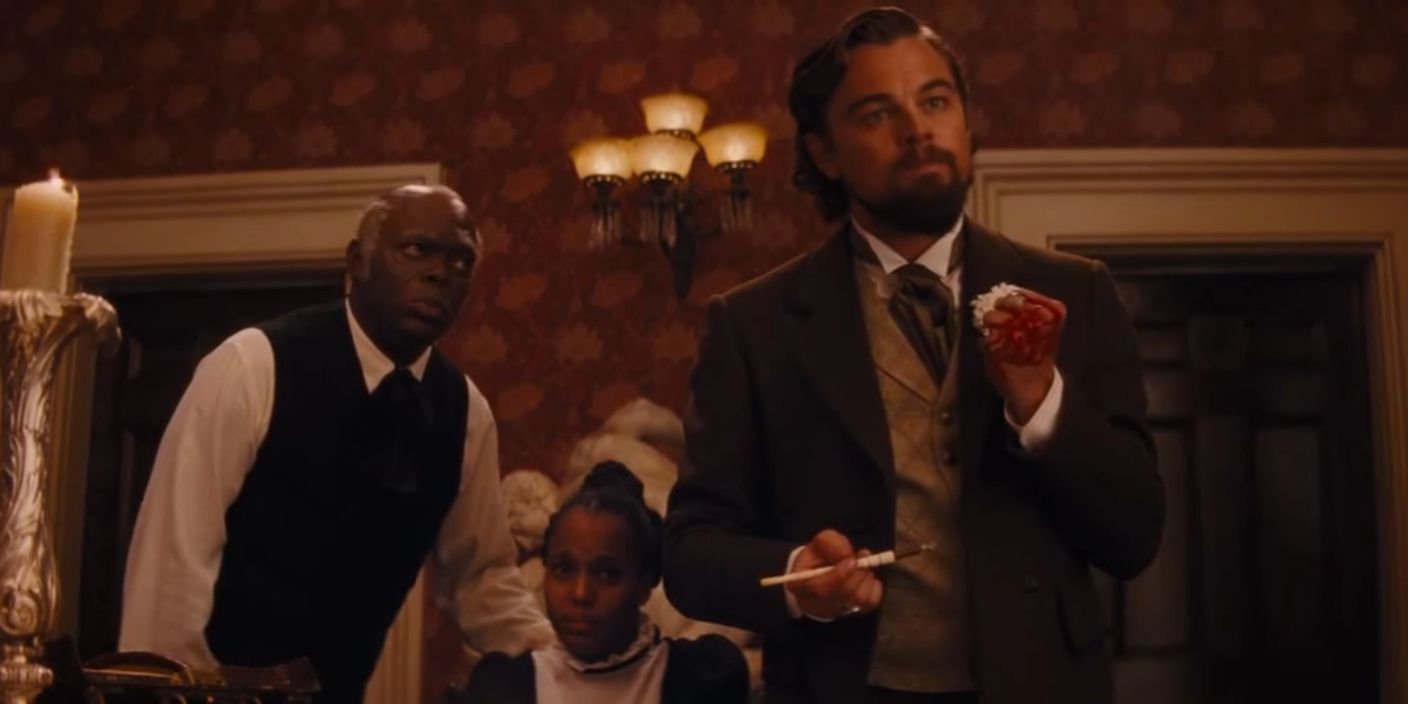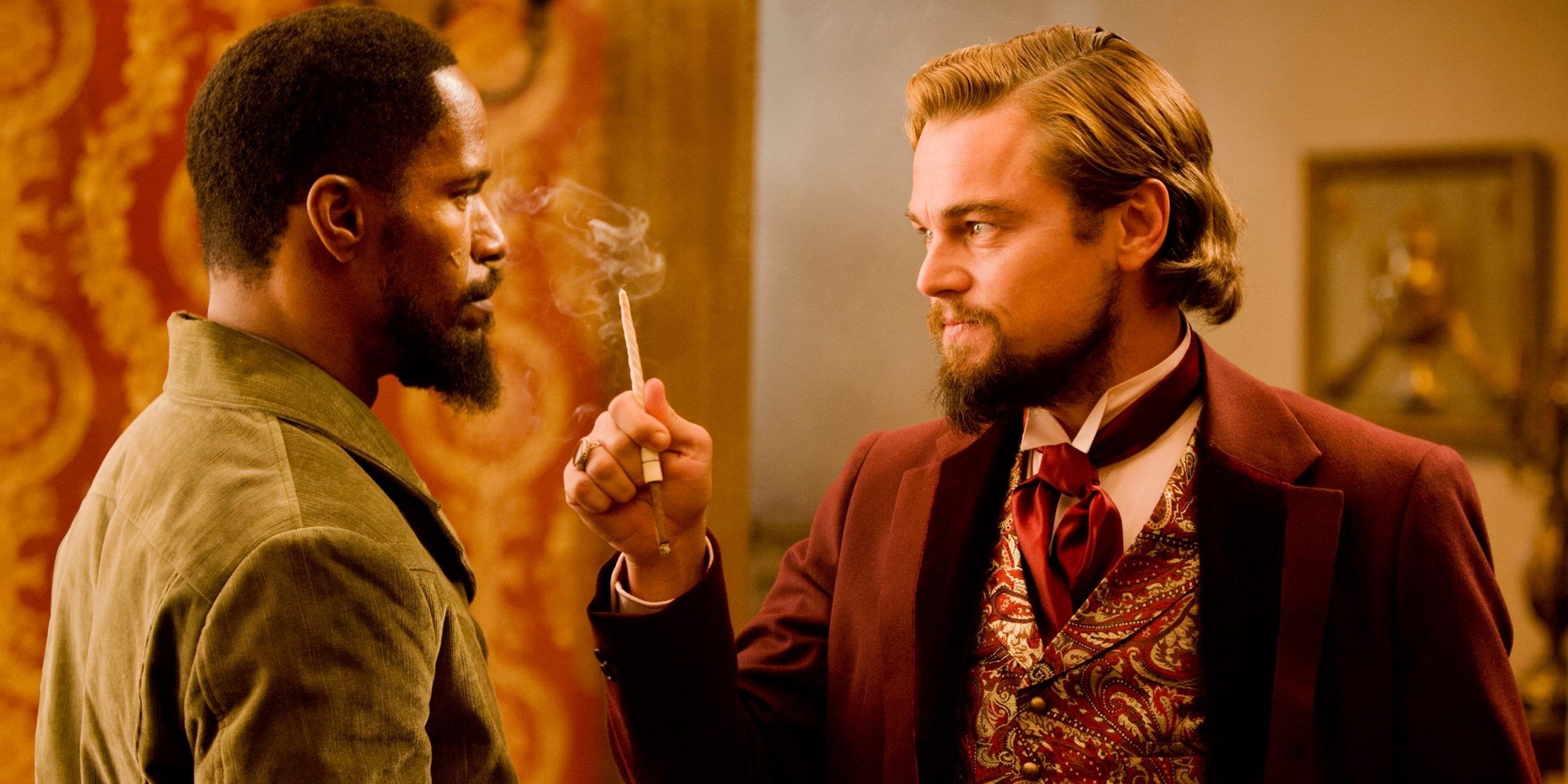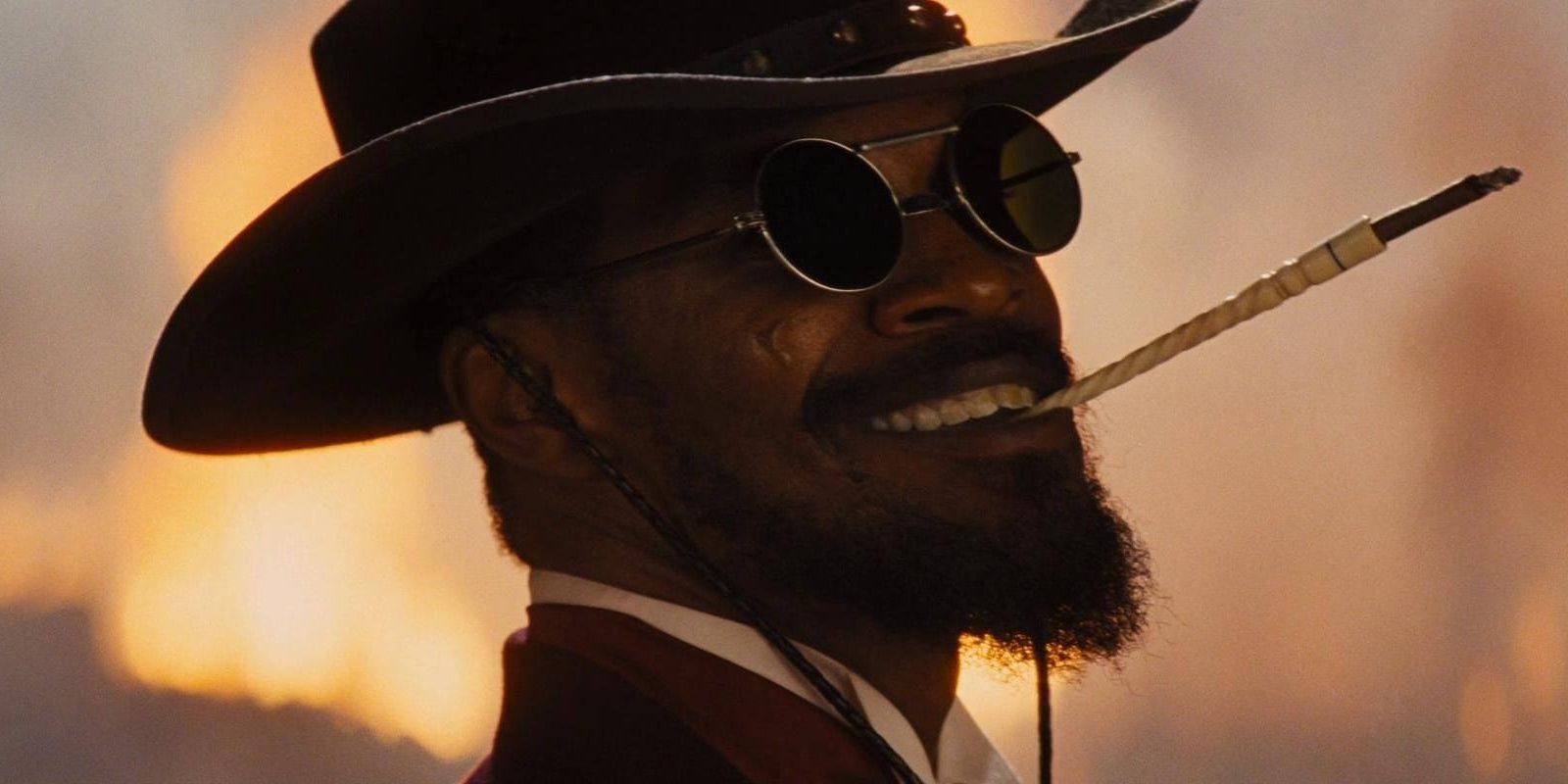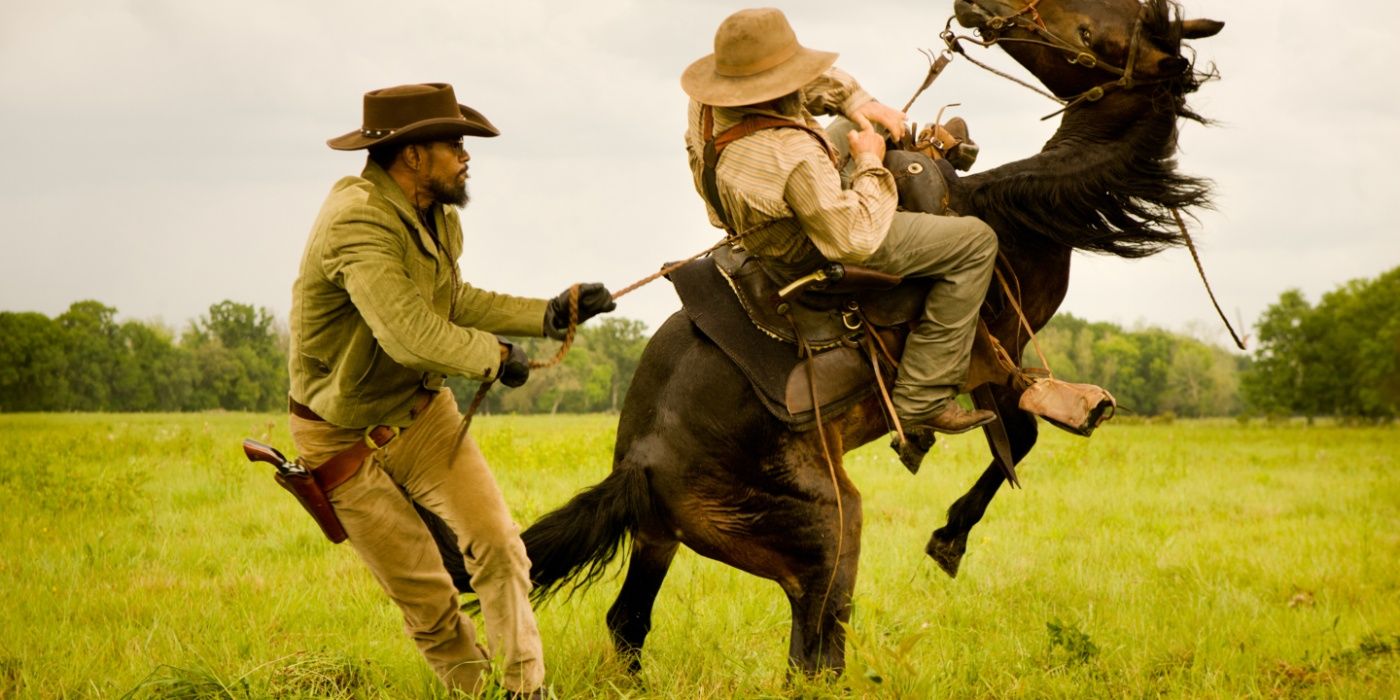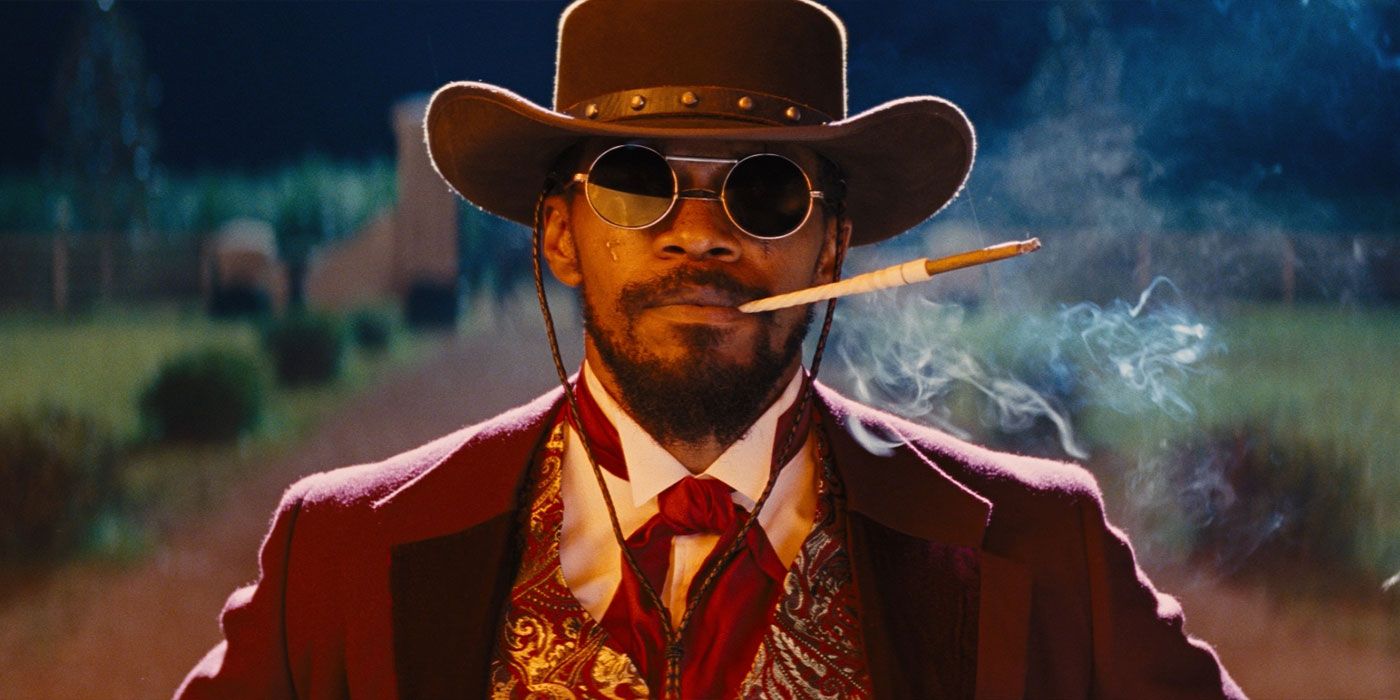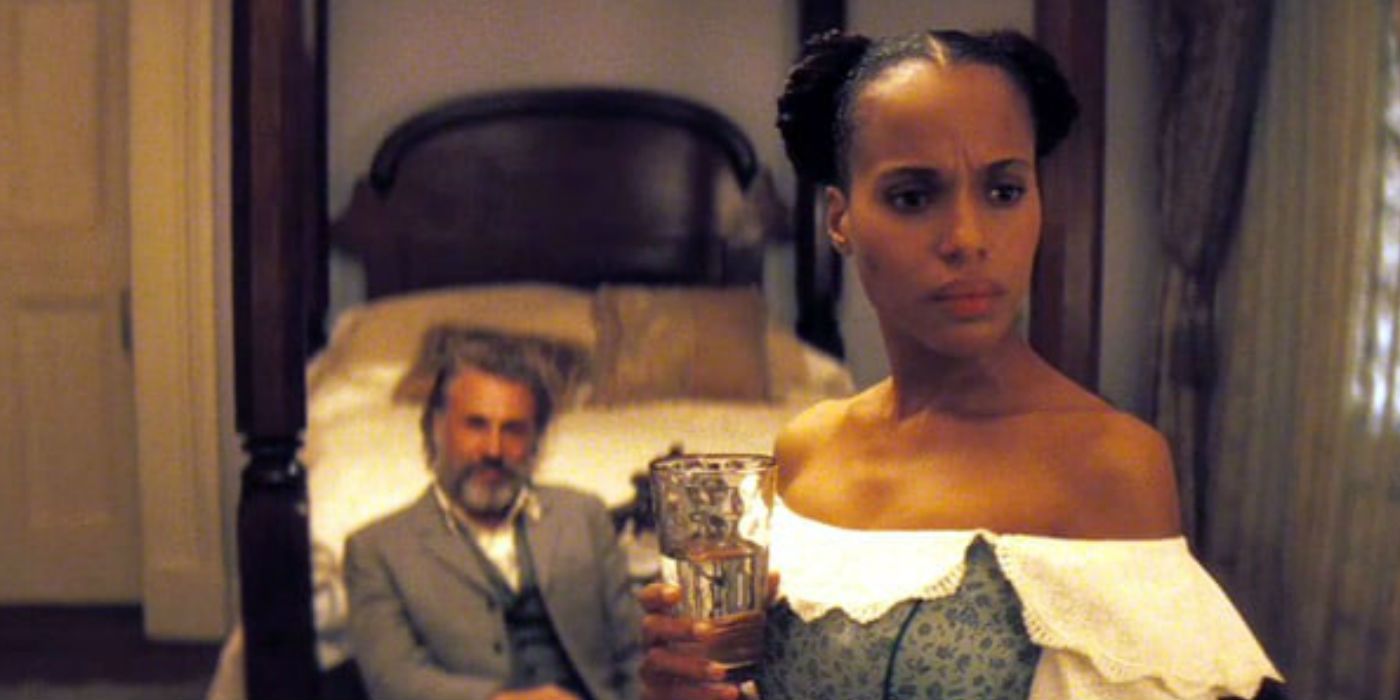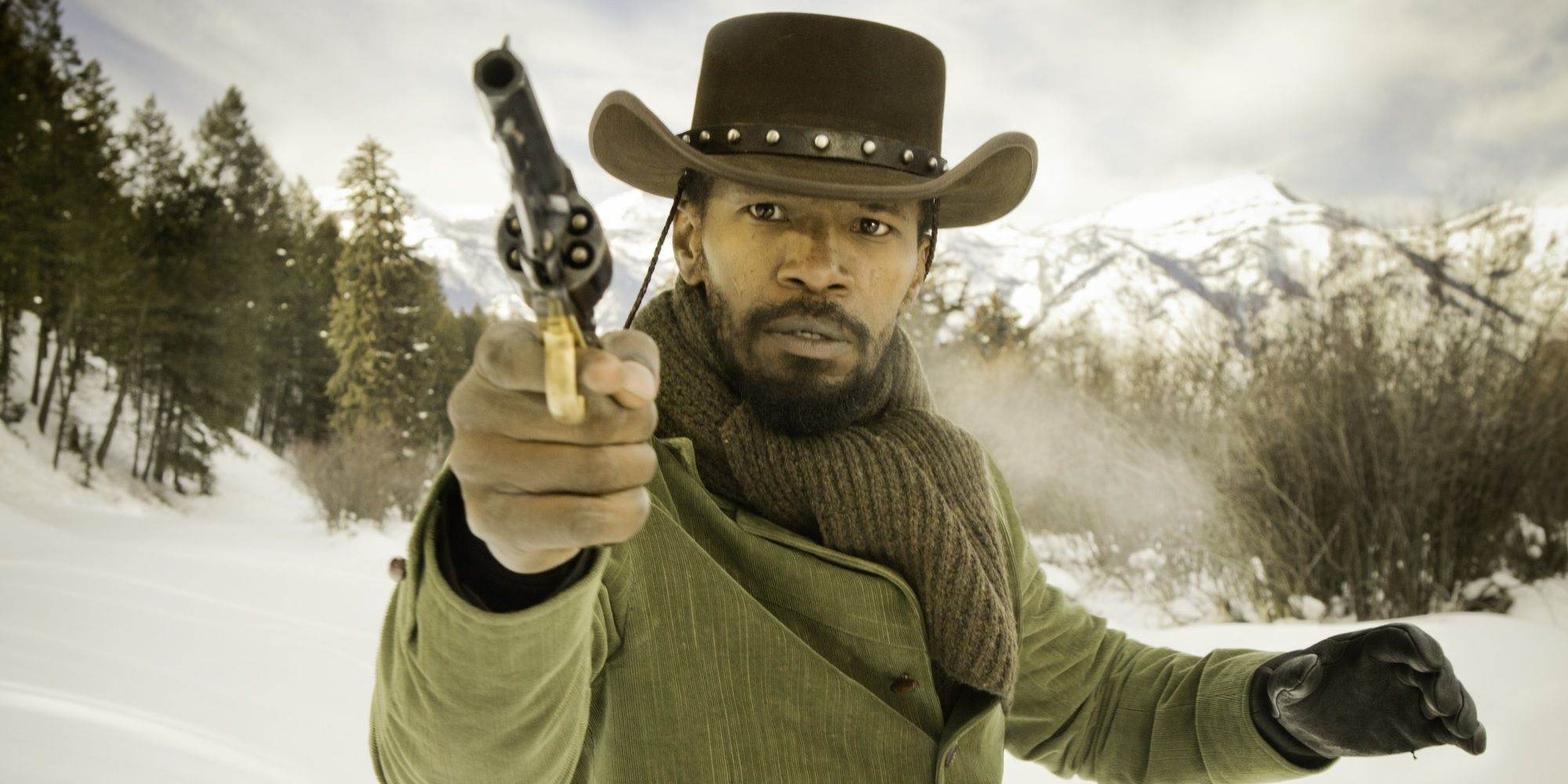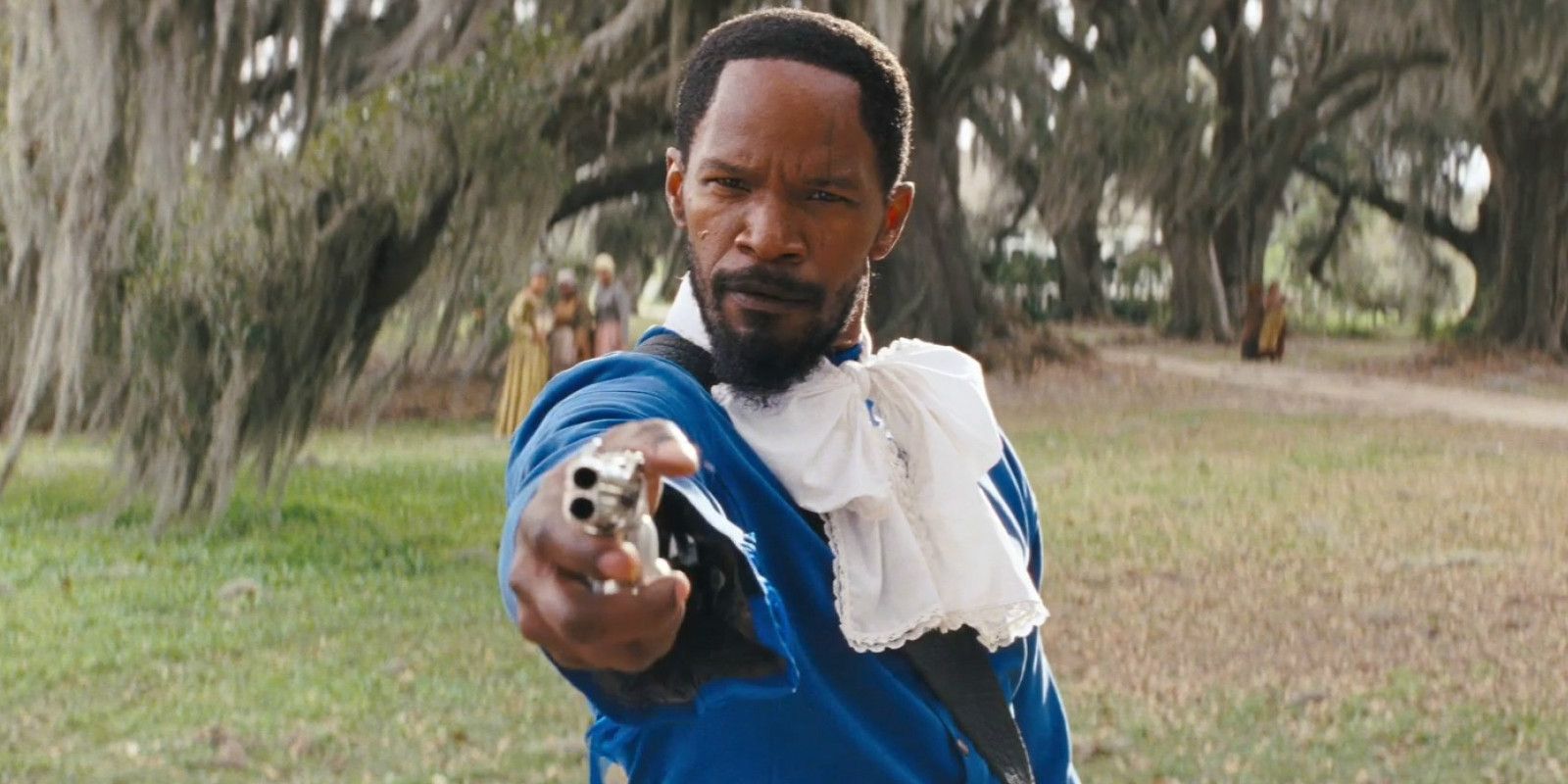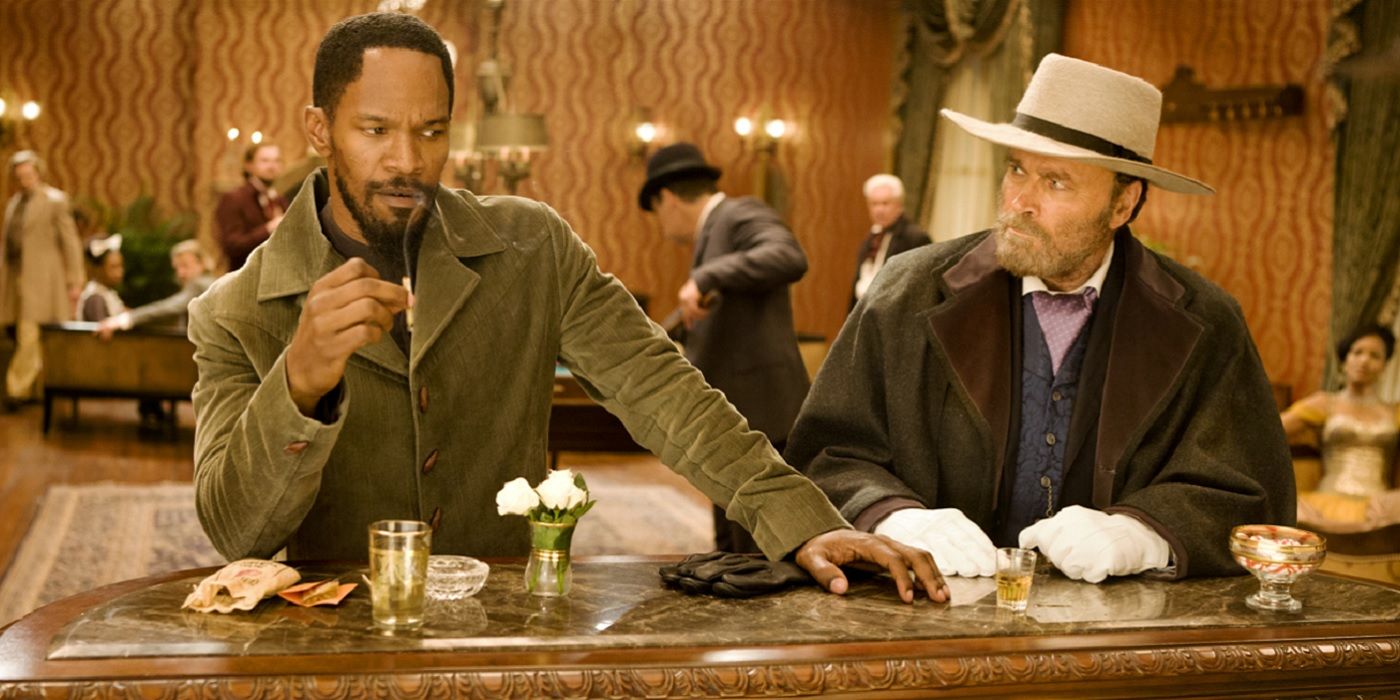Summary
- Django Unchained is a masterful blend of sharp dialogue, vivid characters, unflinching violence.
- Iconic Django quotes embody journey from bondage to liberation, crafted with skill.
- The film's heart and soul found in iconic Django Freeman portrayed by Jamie Foxx.
2012's Django Unchained is another masterfully written movie from Quentin Tarantino, and the razor-sharp script exemplified by the best Django quotes. In Django Unchained, Django's journey from chains to freedom is not just a tale of personal vengeance but a powerful narrative that intertwines the brutal realities of slavery with the fantastical elements of a spaghetti Western. Tarantino's signature blend of sharp dialogue, vivid characters, and unflinching violence is on full display, but it's through the iconic Django Freeman, portrayed with fierce intensity by Jamie Foxx, that the film finds its heart and soul.
His words, often laconic yet laden with meaning, do more than just drive the plot forward; they serve as a testament to his unyielding determination and unwavering moral compass. As Django carves his path through the Antebellum South, his quotes are not mere lines delivered; they are the embodiment of his journey from bondage to liberation, making them integral to understanding both the character and the film itself. These quotes showcase character's indomitable spirit but also to highlight the sheer brilliance of Tarantino's screenplay, where every word is as meticulously crafted as the bullet trajectories Django unleashes on his foes.
Django Unchained is available to stream on Starz.
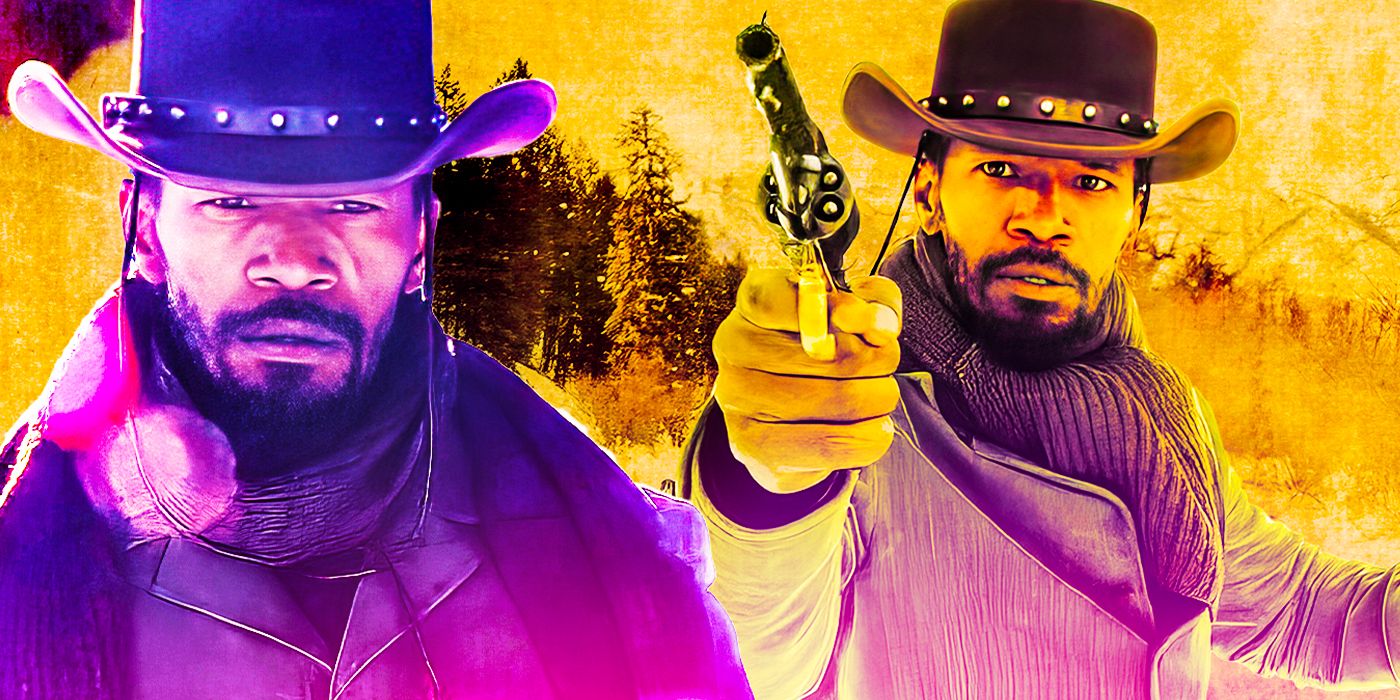
Django Unchained Ending Explained
Django Unchained has an ending that begs to be explained. Here is a deep dive into Tarantino's complex tale of love, freedom, and redemption.14 “I Count Two Guns.”
An Improvised Line That Pays Homage To The Heroes Of Classic Westerns
This line wasn’t in the original script.
Apparently, this line wasn’t in the original script. While the cast and crew were shooting the final showdown, someone noticed that Django had already fired six shots throughout the scene and brought this to Quentin Tarantino’s attention. The writer-director disappeared into his trailer for a few minutes and returned with two newly written lines: one for Stephen with“I count six shots,” and a retort for Django, “I count two guns.”
This impromptu addition exemplifies Tarantino's ability to adapt and inject his film with layers of authenticity and wit on the fly. The exchange between Stephen and Django in the final showdown becomes not just a moment of tension but a display of Django's quick wit and unflappable nature. It's a testament to the character's strategic thinking and survival instincts, qualities that have enabled him to outmaneuver his enemies throughout the film. This dialogue also serves as a nod to the classic Western genre, where the hero's resourcefulness and gunslinging skills are as crucial as their quest for justice or revenge.
13 “What Kind Of Dentist Are You?”
Django Knows That Dr. Schultz Is Much Deadlier Than He Lets On
There are plenty of great duos in Tarantino’s filmography — Jules Winnfield and Vincent Vega, Mr. White and Mr. Orange, Rick Dalton and Cliff Booth etc. — and among the most iconic is the team of Django and Dr. King Schultz. In the opening scene, as Django is being marched through the woods with a chain gang, Dr. Schultz rolls up in a stagecoach with a giant tooth on it. When Django sees Dr. Schultz killing people for money, the question has to be asked: “What kind of dentist are you?”
This line, delivered with a mix of curiosity and bewilderment by Django, is the perfect introduction to the unconventional and multifaceted character of Dr. King Schultz, played with charismatic flair by Christoph Waltz. Schultz's response and actions following this question not only set the tone for their relationship but also for the entire film. It marks the beginning of an unlikely partnership between a freed slave and a German bounty hunter posing as a dentist, one that is rooted in mutual respect and a shared goal that goes beyond personal gain.
12 “Cora, Before You Go, Will You Tell Miss Lara Goodbye?”
A Django Quote That Exemplifies Tarantino's Mix Of Humor And Drama
When Lara, Stephen, Billy Crash, and the rest of Calvin Candie’s closest loved ones return from his funeral, Django is waiting in the house for their arrival. He tells Cora, one of Lara’s slaves, to tell her “goodbye” before leaving. A little confused, Cora says, “Bye, Miss Lara.” And, quick as a whip, Django shoots Lara in the chest and sends her flying into the next room. Then, Django tells Cora to “run along now” and she leaves the house in a hurry.
Django shoots Lara in the chest and sends her flying into the next room.
This pivotal scene underscores the dramatic intensity and the darkly comedic undertones that permeate Django Unchained. Django's request to Cora, delivered with a veneer of civility, preludes one of the film's most startling acts of retribution. It's a moment that encapsulates Django's evolution from a chained slave to an avenger of injustice, embodying his determination to dismantle the brutal world of slave ownership piece by piece. The scene is laced with Tarantino's signature blend of stark violence and unexpected humor, as evidenced by Cora's bewildered compliance with Django's request.
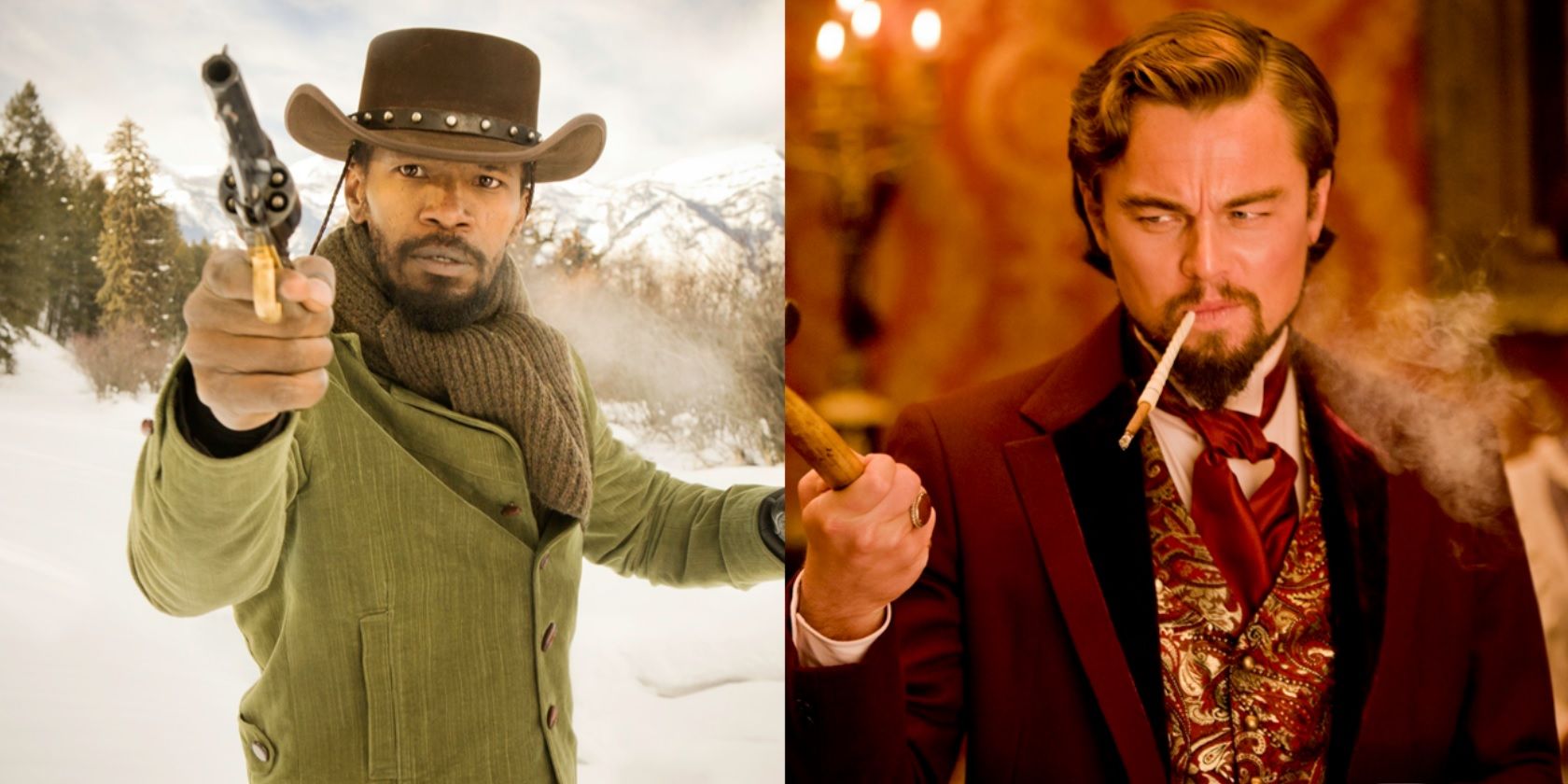
10 Tarantino Trademarks In Django Unchained
From historical revisionism to recycled Morricone music, Django Unchained exhibits many of the tropes and trademarks of Quentin Tarantino's movies.11 “It’s Me, Baby...”
When Django comes to rescue Broomhilda for the second time, she cowers in fear as the door swings open, revealing Django’s silhouette. For all she knows, her captors are back for another horrific assault. But the soothing voice of her husband assures her that she’s in safe hands when he says, “It’s me, baby.” Upon hearing Django’s voice, she lets out a huge sigh of relief.
Django's gentle words, "It's me, baby," are a beacon of safety in the darkness that has enveloped Broomhilda's world.
The moment marks a turning point in Django Unchained, symbolizing not just the physical reunion of Django and Broomhilda but the rekindling of hope and the promise of freedom. Tarantino crafts this scene with delicate precision, contrasting the tense buildup as the door opens with the tender exchange between the reunited lovers. Django's gentle words, "It's me, baby," are a beacon of safety in the darkness that has enveloped Broomhilda's world. This Django quote encapsulates the emotional depth of their relationship, transcending the physical trials they've endured.
10 “You Didn’t Mention Kneecapping.”
Django Shows His Willingness To Make Those Who Wronged Him Suffer
Like most of Tarantino’s movies, Django Unchained is an ode to the satisfaction of a good revenge plot. When Django returns to Calvin Candie’s plantation, he can’t wait to dole out some retribution to Stephen, Calvin’s house slave, who tortured Django. When he captured Django, Stephen said that he’d seen all kinds of things done to slaves. What Django noticed is that he didn’t mention kneecapping. And after pointing this out to him, he shoots Stephen in the kneecap.
This quote comes at a powerful turning point that underscores the brutal reality of Django's world and his willingness to embrace the violence he has learned to wield against those who oppressed him.
This quote comes at a powerful turning point that underscores the brutal reality of Django's world and his willingness to embrace the violence he has learned to wield against those who oppressed him. The act of kneecapping, a deliberate and crippling form of punishment, is Django's way of ensuring that Stephen experiences the kind of pain and suffering he facilitated or ignored in others. This particular choice of revenge is significant; it's not just physical violence but a symbolic act meant to incapacitate and humiliate Stephen, reflecting the physical and psychological tortures inflicted upon slaves.
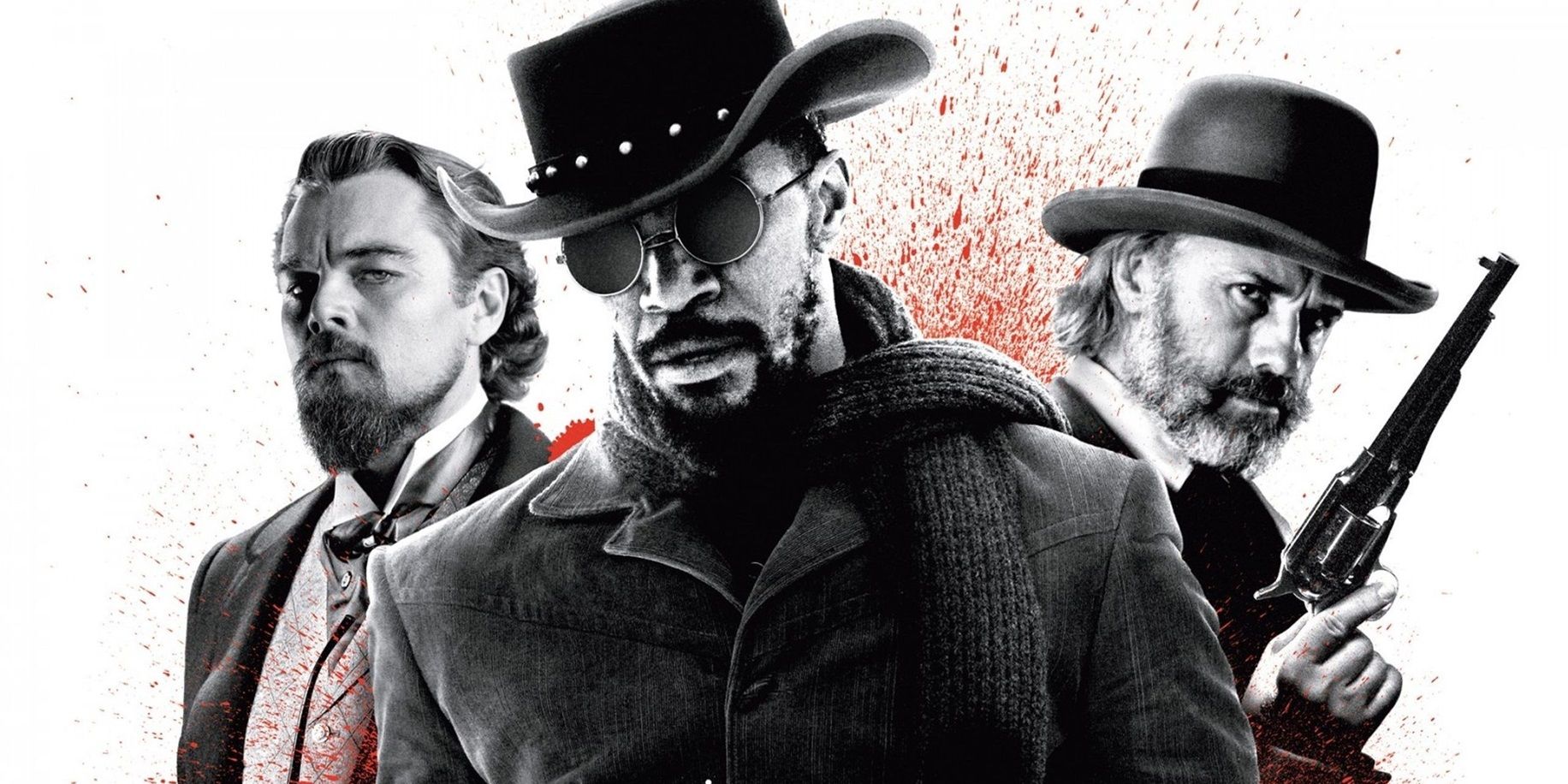
Django Unchained Cast & Character Guide
The sprawling ensemble cast of Quentin Tarantino's Django Unchained is full of major movie stars, including Jamie Foxx, and renowned character actors.9 “I’m Curious What Makes You So Curious.”
Part Of The Exemplary Verbal Duel Between Django And Calvin
The acting in Django Unchained is incredible. Not only do the actors give terrific performances in their roles, but they also have brilliant chemistry. Jamie Foxx and Christoph Waltz developed a real friendship as Django and his mentor Dr. Schultz. And the tension is palpable in the scenes between Foxx and Leonardo DiCaprio where Django is trying to hide the fact that he’s not really a black slaver and Calvin is trying to figure out Django’s deal. This Django quote is a perfect example of that, as the two are constantly trying to one-up each other.
The line "I'm curious what makes you so curious" is a prime example of the intricate dance of wits and wills that defines Django Unchained.
The line "I'm curious what makes you so curious" is a prime example of the intricate dance of wits and wills that defines Django Unchained. It encapsulates the psychological warfare waged beneath the surface of polite society, where every word and gesture is loaded with multiple meanings. This exchange between Django and Calvin Candie is not merely a conversation but a duel, with each participant probing for weaknesses while guarding their own vulnerabilities. The brilliance of this line, and indeed the scene it belongs to, lies in its ability to convey the tension and danger of the situation through subtlety.
8 “Y’all Gonna Be Together With Calvin In The By-And-By... Just A Bit Sooner Than Y’all Was Expecting!”
Django Informs His Foes Of The Coming Reckoning
In the final scene of Django Unchained, the title character is waiting at Calvin Candie’s house for the mourners to return from his funeral. He hears them singing the classical Christian hymn “In the Sweet By-and-By,” a song about losing a loved one and promising to meet them “in the sweet by-and-by” (in other words, in the sweet embrace of death). So, he starts singing along and they’re shocked to see him. He tells them that all of them will, in fact, be meeting Calvin “in the by-and-by” — immediately, because he is about to kill them.
Django's line, delivered with chilling calmness by Foxx, is a masterful stroke of irony and foreshadowing.
This moment in Django Unchained is emblematic of Quentin Tarantino's flair for blending dark humor with intense dramatic moments. Django's line, delivered with chilling calmness by Foxx, is a masterful stroke of irony and foreshadowing. The hymn "In the Sweet By-and-By," with its themes of reunion and eternal peace, contrasts starkly with the violent retribution that Django is about to unleash. This juxtaposition heightens the scene's emotional impact, showcasing Django's transformation into an avenger who, despite the righteousness of his cause, is not immune to the corrosive effects of vengeance.
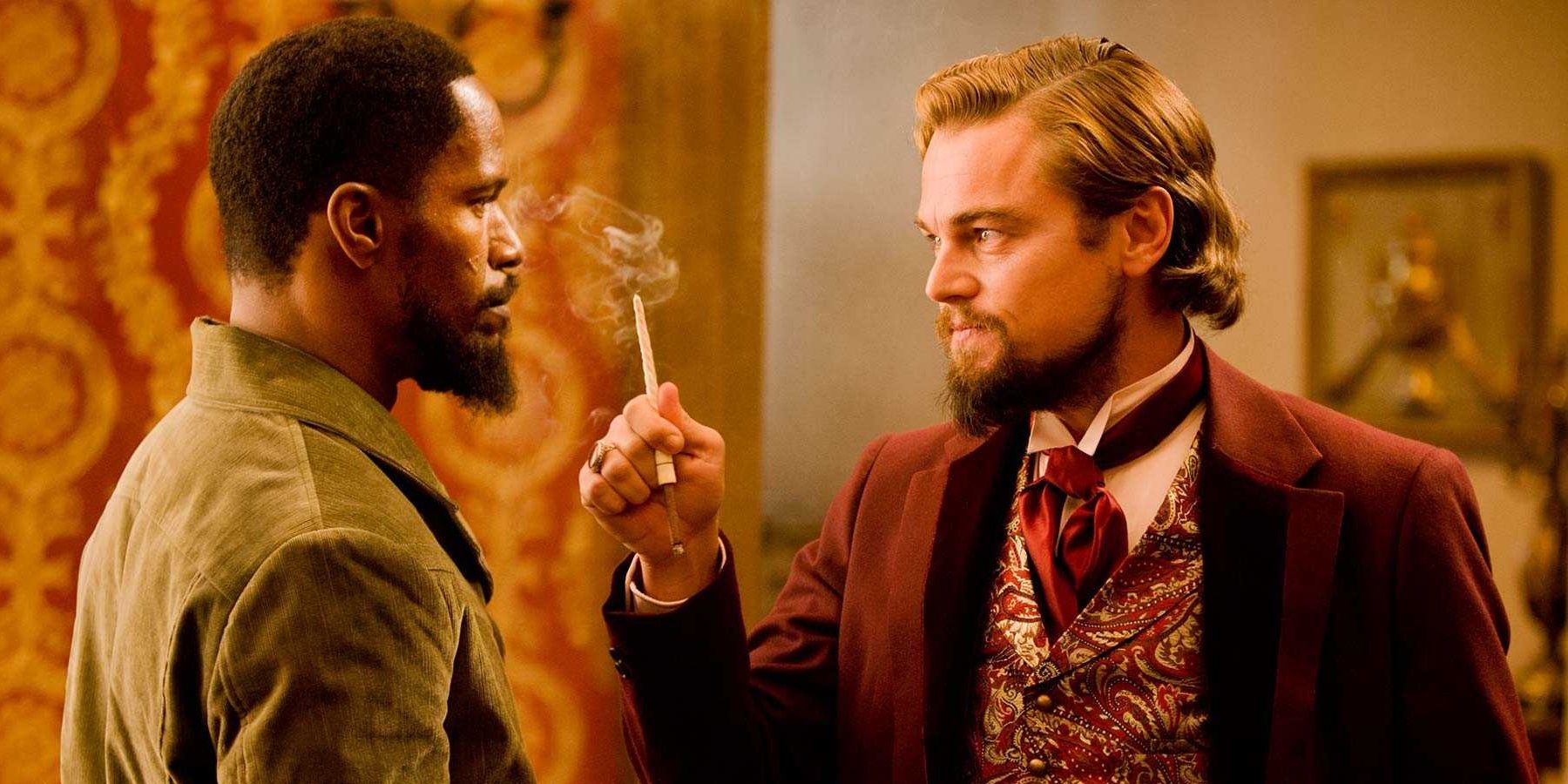
Django Unchained: Why Django Is A Perfect Protagonist (& Candie Is A Perfect Villain)
Quentin Tarantino's Django Unchained features phenomenal performances from Jamie Foxx as the title hero and Leonardo DiCaprio as the evil antagonist.7 “You Better Listen To Your Boss, White Boy!”
A Django Quote That Perfectly Encapsulates The Power Dynamics In The Movie
When Django is a guest of Calvin Candie’s, he can pretty much get away with anything, because Calvin isn’t going to order his guys to do anything to him. He takes advantage of this, yanking one of Calvin’s men off his horse and getting away with it scot-free, and uses it to talk down to the white people who hate him – particularly Billy Crash. One of the important points made by Django Unchained is that the white slavers weren’t just following orders or a product of their time; they really were vicious racists.
The significance of this moment extends beyond the personal satisfaction Django derives from turning the tables on his oppressors; it serves as a sharp critique of the deeply ingrained racism and the dehumanizing system of slavery.
This line, delivered with a biting edge by Django, is a pivotal moment that encapsulates the power dynamics at play within Django Unchained. It underscores Django's growing confidence and his ability to navigate and manipulate the social hierarchies of the Antebellum South to his advantage. The significance of this moment extends beyond the personal satisfaction Django derives from turning the tables on his oppressors; it serves as a sharp critique of the deeply ingrained racism and the dehumanizing system of slavery.
6 “Let’s Get Out Of Here.”
Once Again Tarantino Ends The Movie With A Perfect Final Line
This is Django’s final line in the movie. He’s finally managed to save his wife Broomhilda, he’s burned down Calvin Candie’s house after killing all of his friends, family, and employees, and now, he’s atop his horse, ready to ride off into the sunset with the love of his life. At first, they stick around to watch the house burn and enjoy their long-awaited reunion. But then Django simply says they should get out of there and they ride off together.
The final lines of Tarantino movies are always memorable.
This final line carries with it not just the resolution of a tumultuous journey, but also the promise of a new beginning. After enduring unimaginable suffering and overcoming insurmountable obstacles, Django and Broomhilda are finally free. This simple statement encapsulates the essence of their struggle and the sweet victory over their oppressors. The final lines of Tarantino movies are always memorable. In fact, Pulp Fiction ends with a similar exchange to this one. Vincent says, “I think we oughtta leave now,” to which Jules replies, “That’s probably a good idea.”
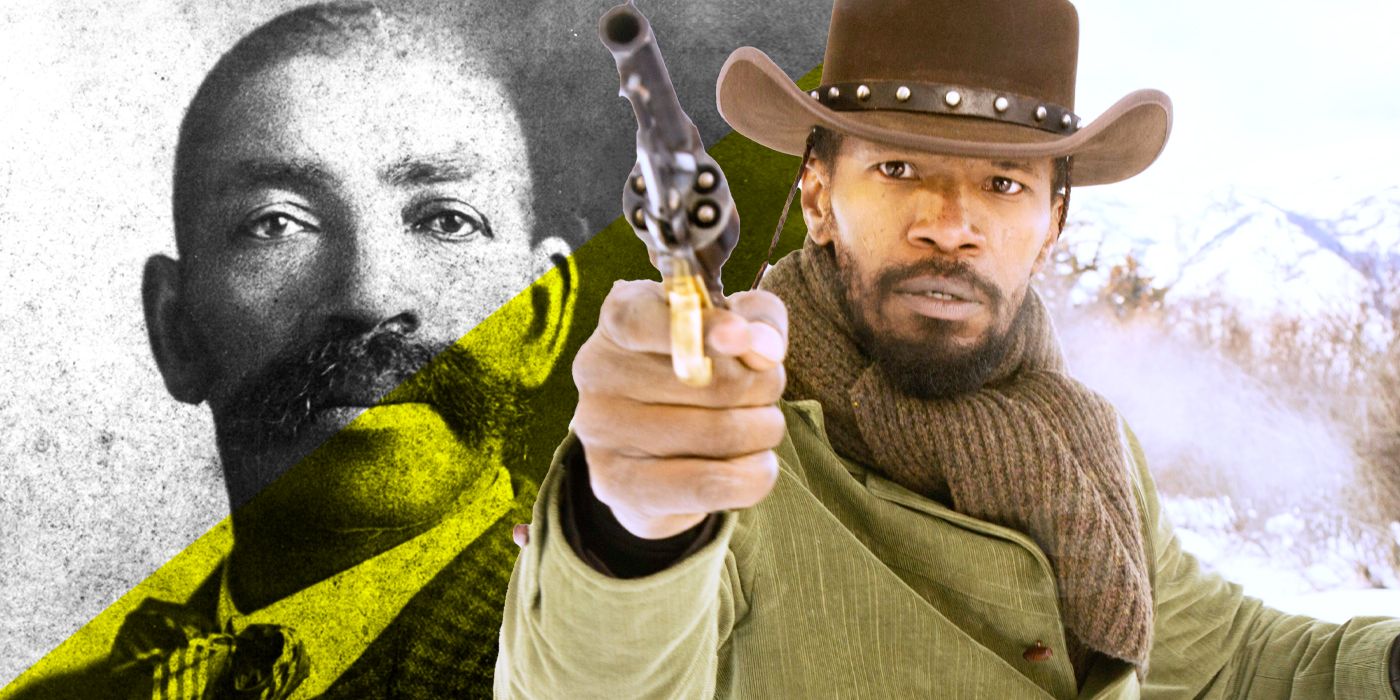
Is Django Unchained Based On A True Story?
Django Unchained tells a story of slavery and racism, but was it based on a true character and story? Here's the truth behind this western.5 “Kill White Folks And They Pay You For It? What’s Not To Like?”
A Realistic Response To The Inhumanity Of Slavery
Jamie Foxx generated some controversy during the promotional tour for Django Unchained when he appeared on Saturday Night Live and said in his monologue, “I kill all the white people in the movie, how great is that?” But come on, the white people in the movie are slave owners, so the fact that he enjoys killing them is sort of justified. He even says a version of that quote in the movie as Dr. Schultz introduces him to the bounty-hunting business. The dentist asks him if he enjoys the bounty hunter trade and he says there’s no downside to getting paid to “kill white folks.”
Django Unchained, through its revisionist Western lens, offers a stark depiction of the cruelty and inhumanity of slavery
The quote "Kill white folks and they pay you for it? What’s not to like?" and Jamie Foxx's subsequent comment during his Saturday Night Live monologue highlights the film's unflinching approach to confronting the brutal realities of slavery and the cathartic fantasy of retributive justice within the context of its narrative. Django Unchained, through its revisionist Western lens, offers a stark depiction of the cruelty and inhumanity of slavery, making Django's journey of vengeance not just a personal quest but a symbolic act of rebellion against an oppressive system.
4 “Hey, Little Troublemaker.”
The Django Quote That Makes Broomhilda Swoon
This is what Django says to his wife Broomhilda that makes her faint in Calvin Candie’s house. He’s the last person she was expecting to see, as they’d been torn apart after an escape attempt and sold to different plantations. She had no idea the kind of adventure he’d been on, getting freed by a dentist, being trained as a bounty hunter, and leading the charge to Candie’s plantation to rescue her. He utters this line a few times in the movie, but the first time, when she faints and Dr. Schultz calls Django a “silver-tongued devil,” is the best-known.
It's a term of endearment that harkens back to a time before their current suffering, evoking memories of their shared past and the love that has endured despite the horrors of slavery.
It's a term of endearment that harks back to a time before their current suffering, evoking memories of their shared past and the love that has endured despite the horrors of slavery. This moment, when Broomhilda faints upon hearing Django's voice, is loaded with significance. It marks the first time they have seen each other since being forcibly separated, a moment that Broomhilda, in her most hopeful dreams, might have scarcely allowed herself to imagine.
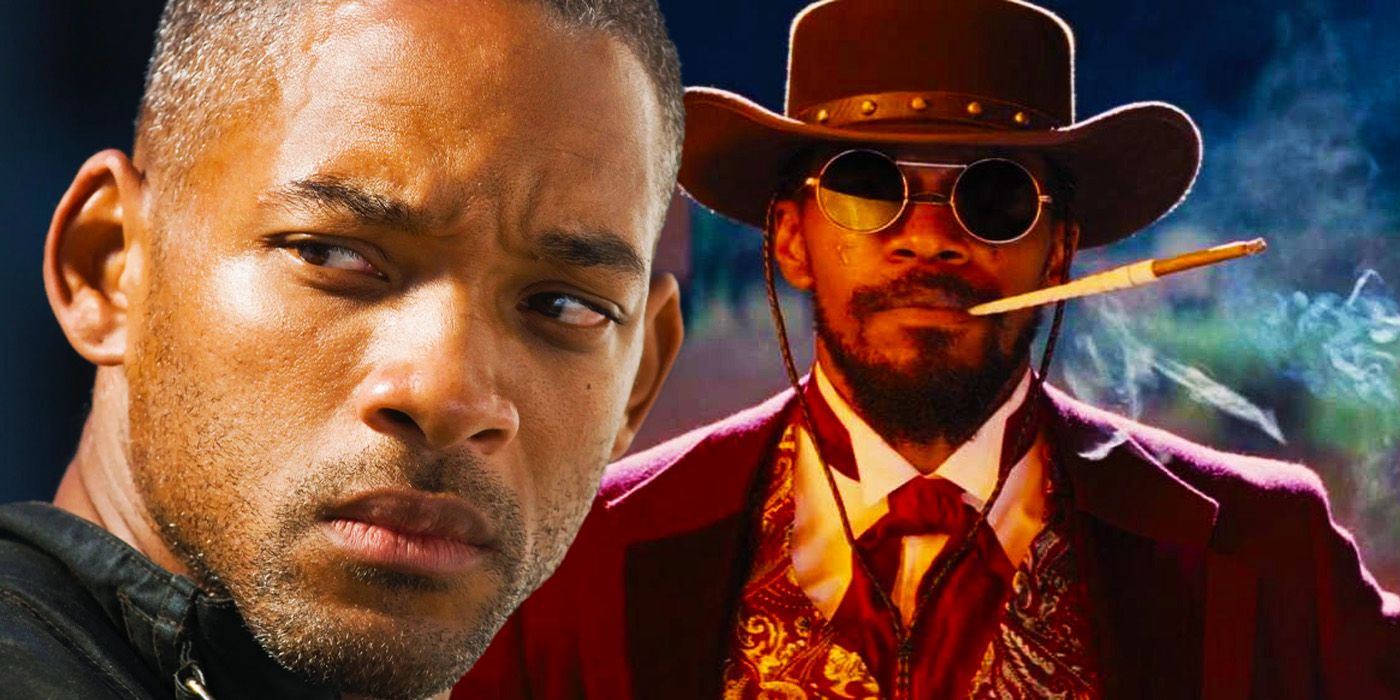
What If Will Smith Played Django In Tarantino's Django: Unchained
Will Smith famously turned down the role of Django due to creative differences with Tarantino. Here's what could have happened had he accepted.3 “D’Artagnan, Motherf****rs!”
A Battle Cry That Shows Just How Intelligent Django Truly Is
This is Django’s battle cry when he bursts into a room full of runaway slave catchers with his guns drawn and blows them all away. After losing his mentor to Calvin Candie, failing to rescue his wife, and getting sold off to some Australian mining company, Django once again breaks away from his shackles and goes on a rampage across the Deep South. Django's primary quest is to save his wife, but if he gets the chance to kill some of his oppressors along the way, that’s just dessert. It’s the most action-packed segment of the movie.
The exclamation as Django storms into the room, guns blazing, is not just a pivotal action-packed moment but a profound declaration of defiance and resilience.
The exclamation as Django storms into the room, guns blazing, is not just a pivotal action-packed moment but a profound declaration of defiance and resilience. This battle cry encapsulates Django's transformation from a man shackled by the chains of slavery to a figure of retributive justice. The reference to D'Artagnan, a famed musketeer known for his bravery and heroism, underscores Django's own courage and his fight against tyranny. It signifies his refusal to be broken by the cruelty he has endured and his commitment to battling the corrupt system that seeks to oppress him and his loved ones.
2 “I Like The Way You Die, Boy.”
What Django does best is reword things that people have said to him later on when he’s exacting his revenge against them. For example, when he comes across “Big John” Brittle, played by M.C. Gainey, he remembers that he once pleaded with him not to whip his wife. Big John sadistically said to him, “I like the way you beg, boy.” So, now that he has the opportunity to have his vengeance, he gets Big John’s whip and uses it to beat the hell out of him. Then he kills him and tells him, “I like the way you die, boy.”
Embodies the film's exploration of revenge and the cathartic release that comes from confronting one's oppressors.
This moment, where Django avenges the cruelty inflicted upon him and his wife by Big John Brittle, is a defining one within Django Unchained. It embodies the film's exploration of revenge and the cathartic release that comes from confronting one's oppressors. Tarantino crafts a narrative where words are not just a means of communication but weapons of power and symbols of transformation. Django's use of Big John's own words against him as he metes out justice is not merely a personal victory; it's a moment of profound irony and reclamation of agency.
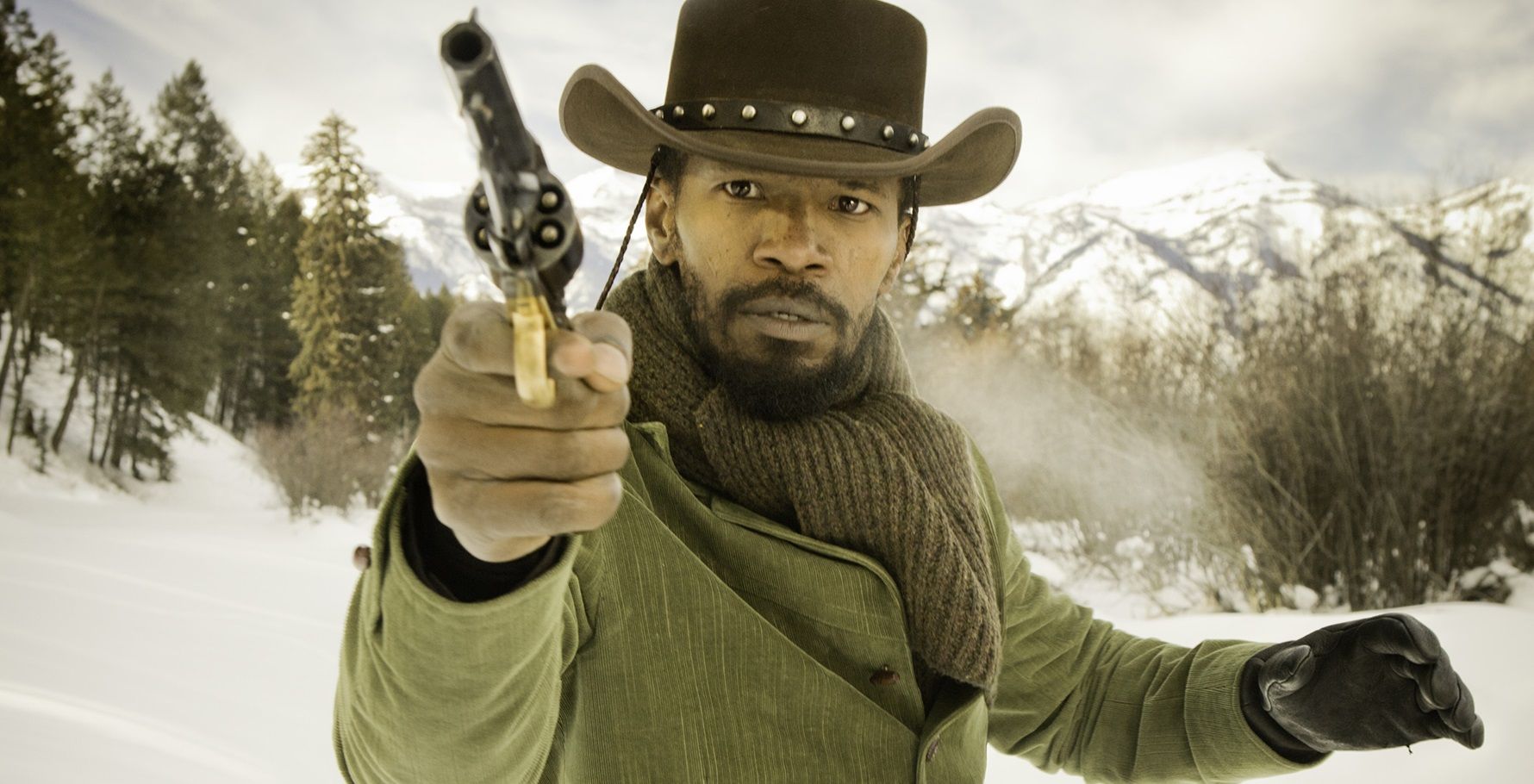
The D Is Silent: 10 Behind-The-Scenes Facts About Django Unchained
Django Unchained is one in a long line of Quentin Tarantino's hits, and here is everything you didn't know but need to know about the movie.1 “D-J-A-N-G-O. The D Is Silent.”
There was a cosmic rightness with Franco Nero’s cameo appearance in Django Unchained. He previously played Django in a series of spaghetti westerns for Sergio Corbucci – the series that inspired Tarantino and name his lead character Django — so it made sense that after Jamie Foxx’s new version of Django told him that the D in his name was silent, he had the perfect response: “I know.” Nero technically wasn’t playing Django; rather, he was playing an original character named Amerigo Vessepi. This was the spaghetti western fan’s alternative of Stan Lee’s cameos in MCU movies.
The scene serves as a clever and respectful nod to the origins of the Django character and the spaghetti western genre that inspired Quentin Tarantino.
The scene serves as a clever and respectful nod to the origins of the Django character and the spaghetti western genre that inspired Quentin Tarantino. Nero's portrayal of Django in the 1966 film directed by Sergio Corbucci has become iconic, cementing the character's place in cinematic history as a figure of resilience and revenge. Tarantino, known for his deep appreciation and knowledge of film history, integrates this moment into Django Unchained as a bridge between the past and present, honoring the legacy of the character and the genre.
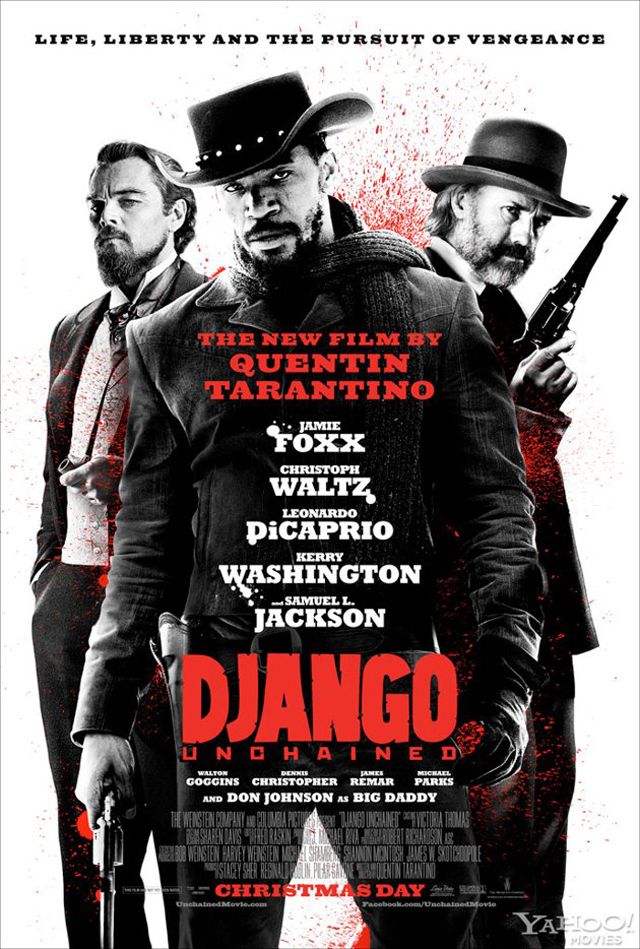
Django Unchained
Quentin Tarantino's Django Unchained follows Jamie Foxx's Django, a Black slave who is freed before becoming a bounty hunter. After meeting German dentist-turned-bounty-hunter Dr. King Schultz, Django sets off to free his wife from the cruel and charismatic plantation owner Calvin Candie. Christophe Waltz stars alongside Foxx, with Leonardo DiCaprio, Samuel L. Jackson, and Kerry Washington rounding out the cast of Tarantino's revisionist Spaghetti Western.
- Director
- Quentin Tarantino
- Release Date
- December 25, 2012
- Studio(s)
- Sony
- Writers
- Quentin Tarantino
- Cast
- Leonardo DiCaprio , Jonah Hill , Samuel L. Jackson , Jamie Foxx , Kerry Washington , Christoph Waltz
- Runtime
- 165 minutes

